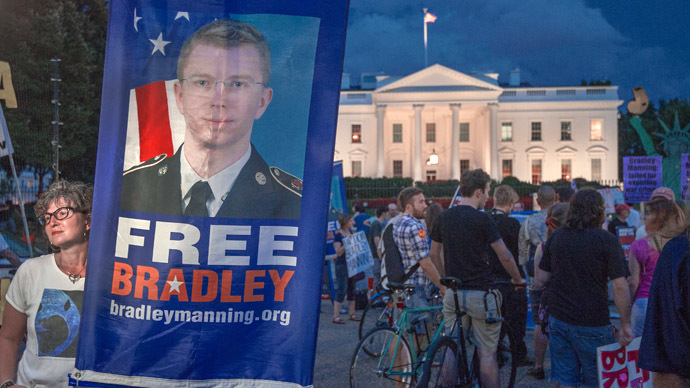Manning verdict will only make whistleblowers ‘more careful’

Whistleblowers will become more determined, more tactical and more careful after Bradley Manning received a 35-year prison sentence, former MI5 agent Annie Machon tells RT.
It is also important to the future of whistleblowers in
intelligence and the military that Snowden and Assange “survive
their processes,” and evade attempts to be silenced and
imprisoned.
RT:35 years as a former MI5 agent, do you think that Manning was justified to leak these documents, bearing in mind he was of course serving member of the military?
Annie Machon: I think we go back to Nuremberg principles
here, which is: do you just follow orders, even if they are
obviously just for war crimes, or do you stand by your
conscience? And I think all the international laws that followed
World War II show that you are breaking the law if you just
follow orders and do illegal things. So I think the stand he
took, the fact that he wanted to try and make a difference - he
has said this explicitly both privately and publicly, he wanted
to make a difference, he wanted to inform the world’s people
about the war crimes being committed and he wanted to stop future
illegal wars - it was a noble thing to do. I think he knew the
risks, he did a brave thing.
RT:Will he make any difference though, will the US and
other countries continue to pursue their foreign policy and
military campaigns despite what has been revealed?
AM: I think he already has made a difference, not just in
sparking a debate about some of these issues, but also in
accelerating the US withdrawal from some of the countries in the
Middle East militarily, which will of course have saved US
military lives as well as the lives of the people in those
countries. So I think he has already made a difference.
The fact that we are debating these sort of issues and we know
that war crimes have been committed, particularly the revelation
of the collateral murder video, which showed that innocent
Iraqi’s and journalists were being shot up in some sort of sick
snuff-type video and also that the Pentagon had lied about it for
years, has exposed the fact that we cannot trust our governments,
our military and our intelligence not to lie to us and not to
commit war crimes.
So I think that’s very important. I have to say, though, that 35 years in prison for exposing war crimes of others, it’s an incredibly high and vindictive sentence to give to a young man who acted on his conscience.

RT:But he should have been charged though, should he
not? Whistleblowers like Bradley Manning aren’t behind the law.
He did break the law didn’t he?
AM: He did and he knew what he was doing, but I think the
response has been disproportionate, so for example in the UK if
you blow the whistle on the military or the intelligence
agencies, you betray your country to a foreign and hostile power,
you face 14 years in prison and yet he’s facing 35 years in
prison for exposing the crimes of others, which has yet to be
investigated, by the way.
So this disproportionality that is troubling, I have to say, as
well, though, I think there is a crying need - as our countries
get more and more involved militarily and with drone strikes and
with extraordinary rendition and with torture and with CIA kill
lists - there is a crying need now for some sort of avenue to be
provided for young men and young women of conscience to come
forward and say, “We are troubled by this, we would like an
investigation,” and not have to risk the rest of their lives
being locked up in a maximum security prison by doing that,
because they are actually providing a service to our democracies.
RT:But do you really believe that you mentioned the
crimes of others, that those who have been exposed for doing very
wrong things will be held to account, will there be any judicial
process because after all these are authorities from
government?
AM: Yes that is always the problem and there have been
many, many whistleblowers coming out of both the US and the UK
intelligence agencies over the last two decades and nothing much
ever seems to change and that is a problem, I think, for our
democracies. However, it seems that new whistleblowers are
learning from the mistakes of others, for example with Edward
Snowden. His view was the more draconian the pushback against
whistleblowers, the smarter the whistleblower will get, the more
tactical they will get, the more careful they will get about how
they expose wrong doing in our governments, and that is precisely
what Edward Snowden’s done.
So I think he obviously looked at the Bradley Manning case and
the appalling torture and inhuman and degrading treatment that
was meted out to him and he accordingly got to protect himself.
RT:But Snowden’s facing a very uncertain fate along with Assange, and of course we’ve seen what’s happened to Bradley Manning. You don’t think that this sort of thing is a message to whistleblowers? It will not put them off? Or will it actually encourage them?
AM: Of course it is supposed to be a message to
whistleblowers to stop them doing this in future, however I think
it will make them more determined. I think there are young men
and young women sitting behind desks in intelligence agencies and
the military in our countries now thinking, “Well this is
terrible. What am I going to do about it, and how do I survive
the process?” And that is why it’s so important that Assange and
Snowden survive their processes and I think in the case of the
WikiLeaks secret grand jury, which has been convened in Virginia
for the last two years, the basis for trying to prosecute Assange
and WikiLeaks and that Bradley Manning was aiding the enemy. Now
Bradley Manning was acquitted of aiding the enemy, which means
the publisher of his material cannot now be, surely, accused of
aiding the enemy and being charged under the espionage act, and I
think this is a very interesting time for the attempts to try and
prosecute the WikiLeaks case in America as well.
The statements, views and opinions expressed in this column are solely those of the author and do not necessarily represent those of RT.
The statements, views and opinions expressed in this column are solely those of the author and do not necessarily represent those of RT.













